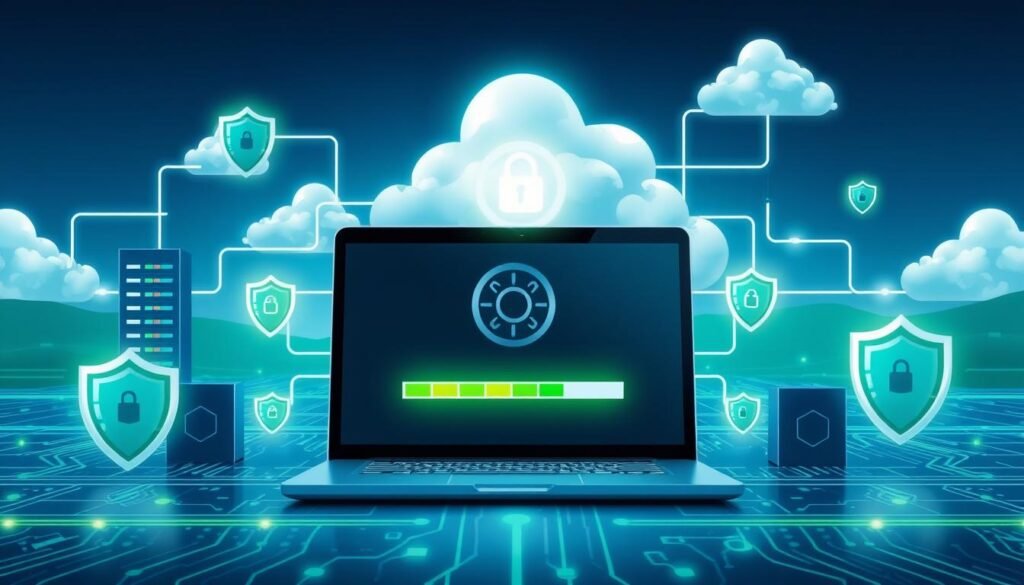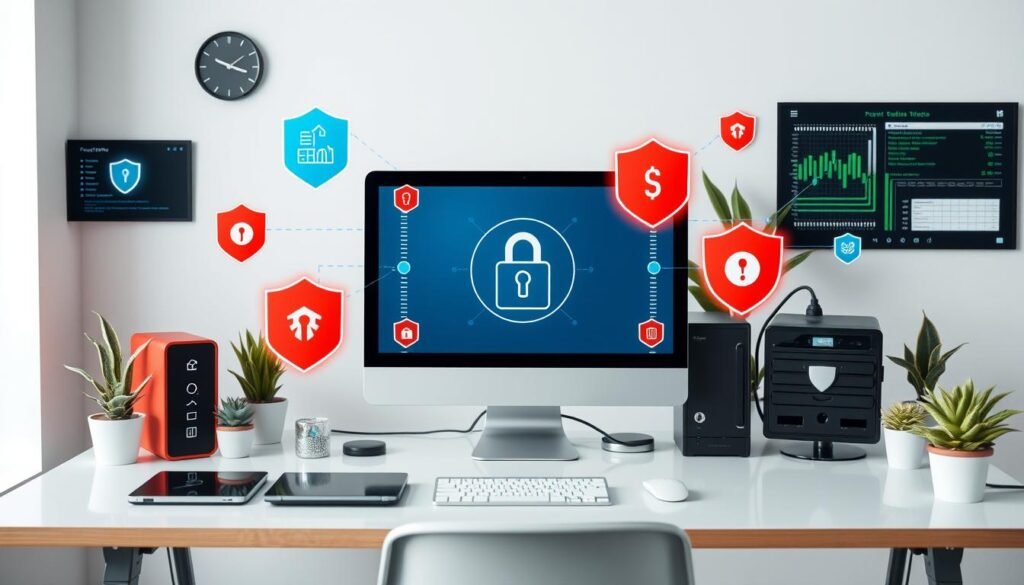Do you think cybersecurity is only for big companies? Think again. Small businesses are now prime targets for cyber attacks. In fact, 71% of cyberattacks hit businesses with less than 100 employees1. This shows how urgent it is for small businesses to have strong cybersecurity.
The world of cybercrime is changing fast, with a 600% rise during the COVID-19 pandemic2. Small businesses are especially at risk, with 60% lacking a cybersecurity policy2. Without proper protection, 60% of small businesses could face closure within six months3.
The cost of a cyberattack can be huge. For companies with fewer than 500 employees, the average cost is $3.31 million3. This shows how important it is for small businesses to protect their data and networks.
In this guide, we’ll share key cybersecurity tips for small businesses. We’ll talk about protecting your data and keeping customer trust. We’ll cover everything from training employees to using the right security tools.
Key Takeaways
- Small businesses are frequent targets of cyberattacks
- Lack of cybersecurity measures can lead to business closure
- Financial impact of cyberattacks on small businesses is significant
- Employee education is crucial for reducing security risks
- Implementing multi-factor authentication enhances security
- Regular software updates and backups are essential
- Cyber insurance can help mitigate financial risks
Understanding Small Business Cyber Threats
Small businesses face unique cybersecurity challenges. They often have limited resources, making them vulnerable to cyber threats. Let’s look at common attacks, why they’re targeted, and the financial impact of breaches.
Common Types of Cyber Attacks
Cybercriminals use many tactics to target small businesses. Ransomware, malware, and phishing are common threats. Employee mistakes, like losing devices, cause nearly half of data breaches4.
Phishing is a cheap way for attackers to get into systems. It’s a big problem5.
Why Small Businesses are Prime Targets
Small businesses lack strong cybersecurity, making them targets. They can’t always defend against advanced attacks like ransomware5. Often, only the IT department handles cybersecurity, leaving the company open to threats5.
This lack of security awareness across the company is a big problem. It gives cybercriminals many chances to attack.
Cost Impact of Security Breaches
Security breaches can hurt small businesses a lot. The costs aren’t just financial. They also include damage to reputation and even business closure. It’s important to have good cybersecurity policies and do regular risk assessments to avoid these problems.
| Security Measure | Benefit | Implementation |
|---|---|---|
| Multi-Factor Authentication (MFA) | Enhances security, reduces risks | Apply to all devices and apps45 |
| Strong Passwords | Reduces brute-force attacks | Use numbers, letters, symbols4 |
| Regular Backups | Protects against data loss | Store copies offline4 |
| VPN Usage | Secures remote access | Encrypt data for remote work4 |
Understanding threats and using good malware prevention can help small businesses. Regular training, software updates, and secure login methods are key to strong cybersecurity policies5.
Cybersecurity Tips for Small Businesses
Mastering Cybersecurity is crucial for small businesses facing numerous cyber threats. It’s key to have strong security measures in place to protect data and networks. Here are some important tips to keep your digital assets safe:
First, focus on training employees. A big 85% of data breaches come from human mistakes. This shows how vital security training is6. Teach staff to spot phishing, handle sensitive data, and follow security rules.
Make passwords strong. Use passwords that are at least 15 characters long and change them every three months7. Also, use multi-factor authentication (MFA) to stop over 99.9% of attacks6. Password managers can help create and keep unique passwords for each account, making security better.
Use good firewalls and antivirus software to protect your network. Keep them updated for the latest security7. A Virtual Private Network (VPN) is also great for safe remote access, adding extra protection for your data.
| Security Measure | Benefit | Implementation |
|---|---|---|
| Employee Training | Reduces human error-related breaches | Regular workshops, simulations |
| Strong Passwords | Enhances account security | 15+ characters, quarterly changes |
| Multi-Factor Authentication | Blocks 99.9% of compromise attempts | Enable on all accounts |
| Firewalls and Antivirus | Protects against malware and intrusions | Install, update regularly |
| VPN | Secures remote access | Set up for all remote workers |
Remember, 43% of cyberattacks target small businesses, and 60% of those hit close within six months8. By following these tips, small businesses can better defend against digital threats. This helps them stay safe and thrive in our connected world.
Employee Security Awareness Training
Training employees is key to keeping small businesses safe from cyber threats. Cybercriminals are now targeting small businesses more than ever. It’s vital to teach staff about threats and how to prevent them9.

Social Engineering Attack Prevention
Phishing emails cost businesses 12 billion dollars a year. This makes social engineering a big concern9. Teach employees to spot and report suspicious emails and links. Use fake phishing emails to test and improve their skills9.
Security Policy Compliance
Make and follow cybersecurity policies to keep data safe. Mistakes by employees are the main reason for data breaches. This shows the need for clear rules9. In 2023, the average cost of a data breach was $4.45 million, showing how crucial following policies is10.
Best Practices for Data Handling
Teach employees how to protect data properly. With more people working from home, it’s important to have safe remote work practices10. Forrester found that 15% of breaches come from lost or missing devices, showing the need for strict device control10.
Keep training employees on cybersecurity to build a secure culture and hold them accountable9. Use free resources like FEMA’s IS-0906 course or ESET’s one-hour training for remote workers to help your program10. Regular training and tests can greatly lower the risk of security problems caused by human mistakes.
Password Management and Authentication
Keeping your passwords strong is key for small businesses. Weak passwords let hackers in. Make sure your passwords are at least 12 characters long, with numbers, symbols, and letters11.
Strong Password Guidelines
Don’t use the same password for all accounts. Never share passwords by phone, text, or email11. Set a limit on how many times you can try to log in to prevent guessing attacks11.
Change your router’s default name and password. Turn off remote management and log out as admin after setup11.
Multi-Factor Authentication Implementation
MFA adds an extra layer of security. Use it for sensitive information to lower the risk of unauthorized access11. It’s vital for remote work, where security from anywhere is a must12.
Password Management Tools
Password managers are a big help for small businesses. They create strong, unique passwords for each account. This boosts security and makes work more efficient12.
These tools make logging in easier, saving time and keeping customer data safe12. Many offer alerts for security issues, helping catch problems early12.
When picking a password manager, look for AES-256 encryption and end-to-end encryption. Also, check if it reports on password health and use12. Strong passwords, regular updates, and audits help protect against big financial losses12.
Network Security Best Practices
Network security is key for small businesses to stay safe online. It helps prevent cyber attacks and data breaches. This is crucial for keeping your business safe.
Securing your Wi-Fi is a must. Change your router’s name and password often. Use the latest encryption like WPA3. Also, set up strong Pre-shared Key (PSK) passphrases to keep your network safe from hackers13.
Firewalls are important for network security. They block harmful websites and protect your data. Think about using managed firewall solutions for better protection14.
Make and follow network security policies. These should cover remote access and personal device use. Limiting access to data and software helps prevent insider threats13.
Keep everything updated. Make sure your security software, web browsers, and operating systems are current. This helps fight off viruses and malware13. Automatic backups help recover data quickly in case of an attack14.
| Network Security Measure | Importance | Implementation |
|---|---|---|
| Wi-Fi Security | High | Use WPA3, strong passwords |
| Firewalls | Critical | Managed solutions, regular updates |
| Security Policies | Essential | Clear guidelines, employee training |
| Software Updates | Crucial | Regular, automatic updates |
By following these network security tips, small businesses can defend against cyber threats. They can also protect their important data.
Data Backup and Recovery Strategies
Small businesses must protect their data from cyber threats and loss. They need strong backup and recovery plans for this. These plans are key for keeping data safe and managing risks15.
Cloud Backup Solutions
Cloud backup is great for small businesses. It offers easy access, flexibility, and disaster recovery15. Many choose hybrid cloud solutions for a mix of speed and security16.

Offline Storage Options
Local backups with external hard drives or NAS devices are fast15. The 3-2-1 rule suggests having three data copies on two types of media, with one off-site16. This keeps data safe and available for small businesses.
Recovery Plan Implementation
A detailed recovery plan is vital for quick data restoration after a breach or failure. Small businesses should:
- Do a data assessment to find sensitive info
- Choose backup options (on-site or cloud)
- Make backups part of a disaster recovery plan
- Use encryption to protect data16
Automated backup solutions make snapshots of key systems. They capture changes since the last backup15. This saves time and space while keeping data current.
Data backup and recovery plans must grow with your business. Update strategies, add new tech, and improve practices to fight cyber threats16.
Software Updates and Patch Management
Keeping software up-to-date is key for small businesses’ cybersecurity. Regular updates fill in security gaps and fight off new threats. Old software is a big target for hackers, putting many small businesses at risk17.
Automated patch management makes updating easier for networks and devices. These systems tackle many vulnerabilities, making networks safer1817.
Timely updates are very important. In the first half of 2022, ransomware attacks jumped by 41%. Fixing these attacks took much longer than before19. Quick updates can cut down these risks and speed up fixes.
Best Practices for Update Management
- Create a schedule for manual updates
- Prioritize critical security patches
- Educate employees on the importance of updates
- Use patch management tools for streamlined processes
Following these steps can greatly boost your small business’s cybersecurity. Updated software not only fixes bugs but also makes things run better19.
| Update Type | Frequency | Impact on Security |
|---|---|---|
| Operating System | Monthly | High |
| Applications | As Released | Medium to High |
| Firmware | Quarterly | Medium |
By focusing on software updates and patch management, small businesses can boost their fight against malware. This proactive step is a vital part of a strong cybersecurity plan.
Mobile Device and Remote Work Security
In today’s world, keeping mobile devices and remote work safe is key for small businesses. With over 70 percent of workers doing remote work at least once a week, keeping company data safe is harder20.
BYOD Policies
Having a Bring Your Own Device (BYOD) policy is important. It lets employees use their own devices for work while keeping things secure. Make sure to encrypt all devices to lower risks from lost or stolen items20.
VPN Implementation
A Virtual Private Network (VPN) is a must for safe remote access. VPNs keep data safe when employees work from home or use public Wi-Fi. Small businesses with VPNs can make sure remote workers have secure access21.
Mobile Security Solutions
Good mobile security is key to fight threats to smartphones and tablets. This includes:
- Keeping the OS up to date to avoid vulnerabilities
- Using antivirus software to fight malware
- Using password managers for safe password storage
- Two-factor authentication for better security20
Strong passwords are very important. They should be at least 15 characters long, with a mix of letters, numbers, and symbols. Encourage changing passwords every three months and use multi-factor authentication on devices and apps21.
Remember, 60% of small businesses hit by cyberattacks close down within six months. By using these mobile security steps, small businesses can lower their risk of cyber attacks21.
Security Tools and Technologies
Small businesses must protect their digital assets with strong security tools. A good cybersecurity plan includes several key technologies. Let’s look at the main parts of a strong defense against cyber threats.
Antivirus Software Selection
Choosing the right antivirus software is key for small businesses. A good antivirus program guards all devices from viruses, spyware, ransomware, and phishing scams22. Endpoint Detection and Response (EDR) tools help spot devices on the network and respond to threats23.
These tools are crucial in fighting off malware attacks and protecting against cyber threats23.
Firewall Configuration
Firewalls are a vital defense for small businesses. They block viruses from entering the network22. Next-Generation Firewalls (NGFW) offer wide protection and use machine learning to detect threats23.
For web apps, Web Application Firewalls (WAFs) filter traffic to guard against hackers and DDoS attacks23.
Encryption Tools
Encryption is essential for small businesses with sensitive data. It keeps data safe by making it unreadable22. Virtual Private Networks (VPNs) provide a secure way for remote workers to connect to company networks22.
Authentication services with VPNs check user identity before network access and encrypt data23. These tips can greatly lower the risk of data breaches and financial losses.
FAQ
- Why are small businesses prime targets for cyber attacks?
Small businesses are often targeted because they have weaker security. They also have valuable data. With limited resources for cybersecurity, they face threats like ransomware and malware.
- What are the essential cybersecurity tips for small businesses?
Key tips include keeping software updated and training employees. Use strong passwords and conduct risk assessments. Also, use VPNs, back up files, and deploy antivirus software.
Secure Wi-Fi networks and follow payment card best practices. Limit physical access to computers.
- How can employee training improve cybersecurity?
Employee training is key because human error is a big risk. Good training can teach employees to spot and prevent attacks. It helps them follow security policies and handle data safely.
- What are the best practices for password management?
Use complex passwords and multi-factor authentication (MFA). Tools like password managers help. Company-wide policies are also important. MFA blocks over 99.9% of attacks.
- How can small businesses secure their networks?
Secure your Wi-Fi and use firewalls. Implement Intrusion Detection and Prevention systems. Set up network security policies and check devices for vulnerabilities.
- Why is data backup important for small businesses?
Data backup protects against loss from cyber attacks or mistakes. Use cloud and offline storage. Regularly test backups to ensure data can be restored.
- How often should software be updated?
Update software regularly to close vulnerabilities. Have a plan for updating all software. Automate updates and schedule manual ones.
- How can small businesses secure mobile devices and remote work?
Implement BYOD policies and use VPNs for remote access. Deploy mobile security solutions and encrypt devices. Teach remote workers about safe public Wi-Fi use.
- What essential security tools should small businesses invest in?
Invest in antivirus software, firewalls, and encryption tools. Consider intrusion detection systems and SIEM solutions. Also, monitor the dark web.
- How can small businesses conduct effective risk assessments?
Do regular risk assessments to find vulnerabilities. Analyze your security, identify assets, and evaluate threats. Use this info to improve security.


